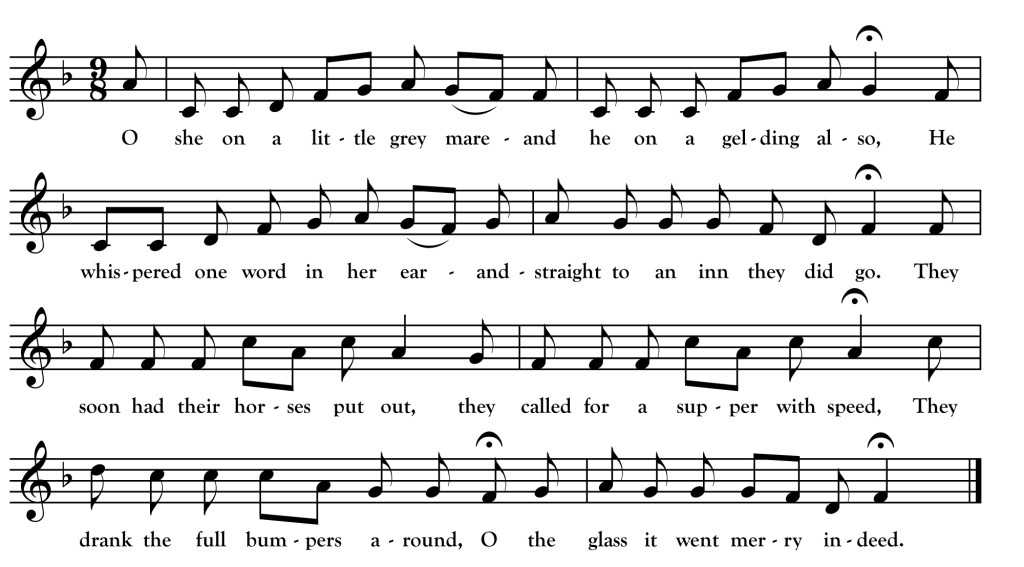The Crafty Miss
O she on a little grey mare and he on a gelding also,
He whispered one word in her ear and straight to an inn they did go,
They soon had their horses put out, they called for a supper with speed,
They drank the full bumpers around, O the glass it went merry indeed.
This miss she arose the next morning two hours before it was day,
She called up the landlord with speed saying “Landlord what is there to pay?”
“Ten guineas” the landlord replied, she paid him his money indeed,
And then to obey her next order, “Go saddle the golden with speed.”
She hoodwinked this young man indeed, she showed him a trick for his gold,
Then mounting the gelding with speed, she left him the mare she had stole,
It was all done in Essex’s county, the truth of it there you will find,
The people they showed him no pity, they said he was served in his kind.
_____________
This month we have the second song of twelve that The Lost Forty (Randy Gosa and I) have arranged and videotaped as part of The Lost Forty Project. I learned last month’s song from a recording of Minnesota singer Michael Cassius Dean and this month’s comes from the other Minnesota singer strongly represented in the project: Reuben Waitstell Phillips.
Phillips was recorded at his home south of Akeley, Minnesota by Robert Winslow Gordon in September 1924—about a week prior to Gordon’s visit to Dean. Like Dean, Phillips had corresponded with Gordon prior to the collecting trip. The above song was one of 22 handwritten song texts Phillips sent to Gordon in March 1924 and one of at least 15 Gordon recorded during his visit to Akeley.
Listen to Reuben Phillips sing part of this song (or click here to view in the MN Folksong Collection):
Phillips titled this light and dancey song (in slip jig time) simply “A Lilt.” It is a version of an English broadside ballad entitled “The Crafty Miss, Or, An Excise-Man Well Fitted” that scholars date to the late 1600s. What is quite unusual for a song of that vintage recorded this far from its origin is that it seems to have been extremely rare in tradition. In fact, I have not been able to find a single collected version from anywhere. The longer broadside versions supply the information that the “hoodwinked” young man was a tax collector and that not only did she make off with his horse but the fact that he was left holding “the mare she had stole” resulted in his arraignment and a narrow escape from “the penalty of the law!”
As I have dug deep into the 47 songs featured in The Lost Forty Project, I have come to marvel at the differences and similarities between the two principle singers: Dean and Phillips. Though it is unlikely they knew each other, both men were born in the 1850s not more than 30 miles from each other in northern New York state and both migrated west to northern Minnesota where they lived just 120 miles apart at the time they were recorded. Still, where Dean’s repertoire is typical of lumberjack-singers of the region in that it is decidedly Irish-American, most of Phillips’ songs are more English/Scottish, quite a bit older and quite a bit more rare. Some of that has to do with their differing ethnic backgrounds but, I suspect, their occupations and routes west played a role as well. More on that in coming months!
This activity is made possible by the voters of Minnesota through a grant from the Minnesota State Arts Board, thanks to a legislative appropriation from the arts and cultural heritage fund.



